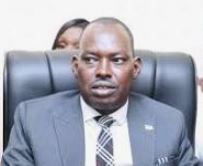South Sudan Minister of Finance and Economic Planning Dr. Marial Dongrin Ater has pledged to improve the country’s economic situation in 2025.
Dongrin made the statement last week during mass at Saint Theresa’s Cathedral Parish in Kator, Juba.
“We have seen a very difficult year 2024, but with the help of God and the resilience of the people of South Sudan we have crossed to 2025,” he said. “I can only assure you that we will even achieve more this year. The government is doing what it can to be able to help address the challenges that we have been going through.”
Dr. Gongrin added: “We request the support of the public to do their part as the government does their part in solving our economic challenges. I also ask the religious leaders and everyone to pray for us to succeed in 2025 and beyond.”
The minister also used the opportunity to celebrate his 14 years of marriage and introduced his wife, children, mother, and two sisters to the congregation while thanking the Catholic Church for blessing the marriage, which has rewarded him with 5 children.
“14 years ago on an afternoon like this on the 29 December, two families with their relatives and friends came to this church (St. Theresa Cathedral) to conduct and celebrate my marriage. I think this is a very special occasion for anyone to remember,” he said. “Today we are all celebrating the new year and thank God for seeing us throughout 2024. I also celebrate the 14 years of marriage that was blessed in this church.”
South Sudan is experiencing a severe economic crisis which is threatening the country’s peace and stability.
The conflict in Sudan has disrupted the flow of South Sudan’s oil to international markets. The shutdown of the Sudanese oil pipeline has led to a contraction of South Sudan’s economy with inflation soaring past 90 percent.
The local currency has lost more than 80 percent of its value against the dollar, increasing the unemployment rate from 12 percent in 2022 to 12.5 percent in 2023.
According to UN reports, over 7 million people are food insecure across the country. South Sudan is also vulnerable to climate change and natural disasters, which have resulted in severe droughts and floods.
The country has very little formal infrastructure, which makes it difficult to transport food and supplies. The crisis is threatening to destabilize the government and jeopardize the country’s fragile peace.
By 8 October 2024, the economy contracted by 5 percent according to the finance ministry.




